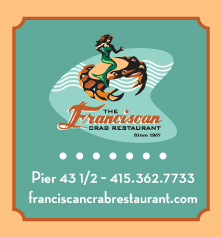Community mediation solves Marina neighbors' dispute
She was sure she knew who did it and confronted the suspect in a hostile, nearly violent encounter ending with a threat to sue. Yet when she discovered the incredible costs and time involved to bring a legal claim, even in small-claims court, the Marina resident reconsidered her options. How could she get her property back without a lengthy legal process that would only increase the tension between her and her neighbor?
To both seek justice and diffuse the conflict, the woman recently decided to turn to Community Boards, a San Francisco nonprofit that provides low-cost mediation services to the City’s citizens and merchants. For only $15, the two neighbors started a community mediation session and sat down with three trained volunteer mediators who listened to their concerns and helped find a mutually agreeable solution.
“We all have common ground, we just have to find it,” said Tom Bonalanza, a Marina resident and volunteer mediator for Community Boards. “People come in to mediation with their fixed positions, but we listen and ask questions that open up thinking and communication. We’ve learned to use language in a way that can change thinking.”
Community Boards has been offering low-cost mediation services in neighborhoods throughout San Francisco for more than 35 years. Unlike the court system, mediation focuses on opening up communication and understanding, and seeks to reach an agreement that is supported by both parties.
“Community Boards is a place for people who feel like they have no control or no power to fix a situation, no matter how small it may be. Even if it is just a neighbor banging a cupboard over and over that disturbs you or thwarts your comfort. As long as the conflict doesn’t involve something physical, Community Boards can help you solve it,” said Bonalanza.
Indeed, Community Boards has addressed everything from labor disputes between workers and supervisors to a father-daughter argument that spiraled out of control.
Even though the cases they accept are diverse, Community Boards solves 90 percent of their cases with an agreement that is supported by everyone involved. Even the suspected theft of designer jeans by a neighbor was successfully mediated. The accused thief agreed to mediation because she herself wanted to stay out of court. Over the course of a three-hour session, the mediators helped the neighbors communicate effectively and find ways to overcome the obstacles standing in the way of a resolution. Eventually, the two parties crafted a mutually acceptable agreement in which the cost of the jeans was reimbursed in exchange for a promise not to pursue a legal action. The agreement, written in the words of each client, reinforces the responsibility of each party to do their part in achieving success. It is binding, but is voided if the case is taken to court at a later date.
Knowing that mediation services both reduce violence and keep disputes out of court, the San Francisco Police Department recommends Community Boards as a first step in resolving conflict. “The Police Department has a long history of working with San Francisco’s Community Boards alternative dispute resolution programs to resolve neighborhood conflicts. These mediation programs allow residents and businesses to resolve minor disputes without reliance on the cumbersome traditional legal system. Police officers regularly refer persons to these programs to promote cooperative problem solving,” says a November 2006 San Francisco Police Department report on community policing.
“With Community Boards, people find a new sense that they can affect change, that they don’t have to be stuck. They start listening and walls come tumbling down,” said Bonalanza.
In recognition of Community Boards’ 35th anniversary in April 2011, the San Francisco Board of Supervisors officially commended the organization whose work has inspired similar community mediation efforts across the world.
Community Boards offers mediation certification courses for volunteers interested in becoming mediators as well. The 40-hour basic course is held over two consecutive weekends several times throughout the year. They currently have volunteers that can offer mediation in English, Spanish, Mandarin, and Cantonese. For more information about becoming a mediator, or to start a dispute mediation case from the comfort of your home using their new online platform, visit www.communityboards.org or call 415-920-3820.
Darlene Weide is the executive director of Community Boards.


